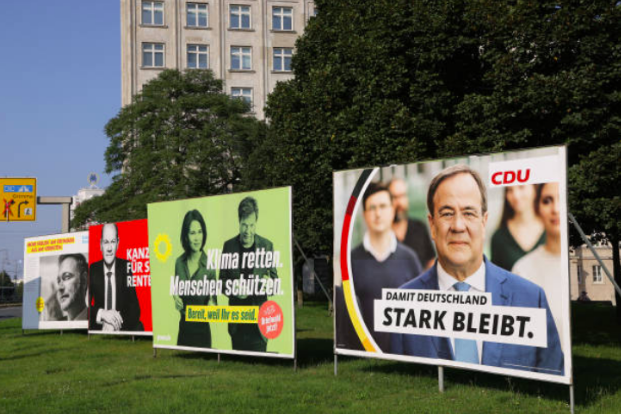By William Demartinis
For the past 16 years, Germany has been led by chancellor Angela Merkel, a now internationally known leader and de facto face of the EU, which was why when she announced her intention to not run in the 2021 election two years ago, everyone knew it would be a defining event that would shape not only Germany’s future, but the entirety of Europe’s. But before I talk about what happened, some context is needed:
Angela Merkel has led the CDU/CSU, Germany’s traditional conservative centre-right party, since 2000. The CDU/CSU is a union of the Christian Democratic Union of Germany & it’s Bavarian sister, the Christian Social Union. Merkel would become chancellor of Germany in 2005, and from then-on, her party would proceed to win elections in 2009, 2013, and 2017.
But what other party would be the CDU’s biggest challenger? We have two: the Greens (Die Grunen) and the SPD (Social Democratic Party of Germany). The SPD is Germany’s longest existing and traditionally Centre-left opposition (Centre left is a description of the party’s ideology, or where their average policies align). However, in recent years, the SPD has seen election loss after loss, and their national vote was roughly 20% in 2017 (Compared to CSU’s 32%). This created a seemingly amazing opportunity for the Greens, who at one time in April were polling narrowly above the CDU and even higher above the SPD. However, by mid-summer, the Greens lead had dissipated and the CDU was polling at 29%, the Greens at 19%, and the SPD at 16% nationally in Germany, with other parties taking the rest.
But, a defining moment in the summer would change that course. In Mid-July, devastating floods would happen across Germany. These floods blew wind into the sails on an already massive issue, Climate Change. Now, it’s almost natural to assume that this would boost the Greens nationally, except it didn’t. The Greens leader, Annalena Bearbock, had made some major errors which had corroded their lead and the party’s popularity. But the CDU’s gaffes weren’t much better, infact, they might’ve cost them the campaign. Or more specifically, Armin Laschet, the CDU’s chancellor candidate, might’ve cost the CDU the campaign. Days after the floods, Germany’s president was giving a speech in one of the flood-devastated towns. Laschet was in the background, and as the President spoke of the grim destruction and death the floods brought, Laschet seemed to be joking and smiling in the background. And while he would apologize for his actions, it cost him. Dramatically cost him.
By early September, tides were dramatically different than the month before. Instead of a CDU victory, the SPD had taken a polling lead. The numbers: SPD 25%, CDU 21%, Greens 17%. Now you may be asking yourself “How could the SPD suddenly lead in polls?” There’s one answer, and it’s a simple one: Olaf Sholz. Olaf Sholz, the incumbent German Finance Minister and SPD chancellor candidate. Just a few months ago he was known as a plain, boring, and uninspiring candidate. But now, he wasn’t viewed as that. Now, he was the safe left-wing moderate with a calm tone and respectful demeanor. He was the most Merkel-like successor to herself, and it seemed Germans wanted that. For quite a long time, polling had put him ahead consistently as to who Germans preferred as their chancellor, but his party wasn’t ahead. Now, his party had joined him. As long as the SPD didn’t mess up, it seemed that the party written off a few months ago was now the frontrunner for the German Elections.
And fortunately for them, they didn’t. The day of the election, polls indicated that the race had barely shifted: SPD 25%, CDU 22%, Greens 16%. But with the context established, what actually happened? While closer than polls predicted, the SPD won the national elections for the first time since 2002, with them gaining 53 seats and winning 25.7% of the popular vote. The CDU lost 50, with it receiving 24.1% of the popular vote, and the Greens gained 51, and scored a respectable 14.8% of the national vote. So the SPD won, right? Well, kinda. A majority in the Bundestag (Germany’s Parliamentary body) is 368 seats, something neither the SPD nor the CDU managed to achieve. So what happens now? One word: Coalitions. With the two most likely coalitions being a “Jamaica” Coalition and a “Traffic Light” Coalition. Jamaica is a coalition between the CDU, Greens, and the Liberal Free Democrats. The “Traffic Light” Coalition is a coalition between the SPD, Greens, and the Free Democrats. Now, it could take anywhere from weeks to months for the parties to formalize a coalition, but it is more likely that the SPD will come out on top. So what does this mean for Europe?
Well, it points to something noticed in Norway as well. A resurgence of left-wing parties across Europe. In Norway, the Labour party won for the first time since 2013, and now, the SPD unseated Europe’s most famous Conservative party. And while Germany marks the end of major elections this year, next year we’ll be keeping a look out for other left-wing parties to see how they perform in Europe and Abroad. For now, that’s all. See you once Germany forms it’s next government!










